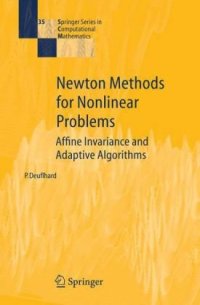
Ebook: Newton Methods for Nonlinear Problems: Affine Invariance and Adaptive Algorithms
Author: Peter Deuflhard (auth.)
- Genre: Mathematics // Computational Mathematics
- Tags: Computational Mathematics and Numerical Analysis, Computational Science and Engineering, Ordinary Differential Equations, Appl.Mathematics/Computational Methods of Engineering, Optimization, Math Applications in Computer Science
- Series: Springer Series in Computational Mathematics 35
- Year: 2011
- Publisher: Springer-Verlag Berlin Heidelberg
- City: Berlin; New York
- Edition: 1
- Language: English
- djvu
This book deals with the efficient numerical solution of challenging nonlinear problems in science and engineering, both in finite dimension (algebraic systems) and in infinite dimension (ordinary and partial differential equations). Its focus is on local and global Newton methods for direct problems or Gauss-Newton methods for inverse problems. The term 'affine invariance' means that the presented algorithms and their convergence analysis are invariant under one out of four subclasses of affine transformations of the problem to be solved. Compared to traditional textbooks, the distinguishing affine invariance approach leads to shorter theorems and proofs and permits the construction of fully adaptive algorithms. Lots of numerical illustrations, comparison tables, and exercises make the text useful in computational mathematics classes. At the same time, the book opens many directions for possible future research.
This book deals with the efficient numerical solution of challenging nonlinear problems in science and engineering, both in finite dimension (algebraic systems) and in infinite dimension (ordinary and partial differential equations). Its focus is on local and global Newton methods for direct problems or Gauss-Newton methods for inverse problems. The term 'affine invariance' means that the presented algorithms and their convergence analysis are invariant under one out of four subclasses of affine transformations of the problem to be solved. Compared to traditional textbooks, the distinguishing affine invariance approach leads to shorter theorems and proofs and permits the construction of fully adaptive algorithms. Lots of numerical illustrations, comparison tables, and exercises make the text useful in computational mathematics classes. At the same time, the book opens many directions for possible future research.